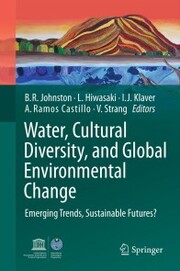Detailansicht
Water, Cultural Diversity, and Global Environmental Change
eBook - Emerging Trends, Sustainable Futures?
ISBN/EAN: 9789400717749
Umbreit-Nr.: 9286277
Sprache:
Englisch
Umfang: 560 S., 18.04 MB
Format in cm:
Einband:
Keine Angabe
Erschienen am 07.12.2011
Auflage: 1/2011
E-Book
Format: PDF
DRM: Digitales Wasserzeichen
- Zusatztext
- <p>Co-published with UNESCO</p><p>A product of the UNESCO-IHP project on Water and Cultural Diversity, this book represents an effort to examine the complex role water plays as a force in sustaining, maintaining, and threatening the viability of culturally diverse peoples. It is argued that water is a fundamental human need, a human right, and a core sustaining element in biodiversity and cultural diversity. The core concepts utilized in this book draw upon a larger trend in sustainability science, a recognition of the synergism and analytical potential in utilizing a coupled biological and social systems analysis, as the functioning viability of nature is both sustained and threatened by humans.</p>
- Kurztext
- <p>This book examines the complex role water plays as a force in sustaining, maintaining and threatening the viability of culturally diverse peoples. It argues that water is a core sustaining element in biodiversity and cultural diversity.</p>
- Autorenportrait
- <p><b>Barbara Rose Johnston</b>is an environmental anthropologist and senior research scholar at the Center for Political Ecology (Santa Cruz, California USA) and a member of UNESCO-IHPs expert advisory group on water and cultural diversity. A leading scholar on political ecology, environmental health, and human rights, she has served as an advisor to the World Commission on Dams, the Marshall Islands Nuclear Claims Tribunal, and governments and dam-affected communities in Guatemala and Chile. bjohnston@igc.org</p><p><b>Lisa Hiwasaki</b>is an environmental anthropologist who launched the UNESCO-IHP project on Water and Cultural Diversity in 2007. Since April 2010 she has been working as Programme Specialist for Small Islands and Indigenous Knowledge at UNESCOs Regional Science Bureau for Asia and the Pacifi c in Jakarta, Indonesia. l.hiwasaki@unesco.org</p><p><b>Irene J. Klaver</b>is Associate Professor in Philosophy at the University of North Texas, USA, and Founding Director of the Philosophy of Water Project www.water.unt.edu . She focuses on social-political and cultural dimensions of water and has directed and produced water documentary fi lms and imaging projects. She is a member of UNESCO-IHPs expert advisory group on Water and Cultural Diversity and Co-Director of the International Association for Environmental Philosophy. Klaver@unt.edu</p><p><p><b>Ameyali Ramos Castillo</b>is an adjunct research fellow at United Nations University - Institute of Advanced Studies (UNU-IAS). Ameyalis research focuses on strengthening linkages between Indigenous Peoples and international policy processes, especially on issues relating to climate change and water. ramos@ias.unu.edu</p><p><b>Veronica Strang</b>is an environmental anthropologist at the University of Auckland, and is internationally recognised for her work on water issues. She has participated in steering and advisory groups for UNESCO-IHPs programmes in Ecohydrology and in Waterand Cultural Diversity. In 2007 she was named an international prize Les Lumières de LEau at the Cannes International Water Symposium. Her most recent book is Gardening the World: agency, identity and the ownership of water (2009). v.strang@auckland.ac.nz</p><p>
